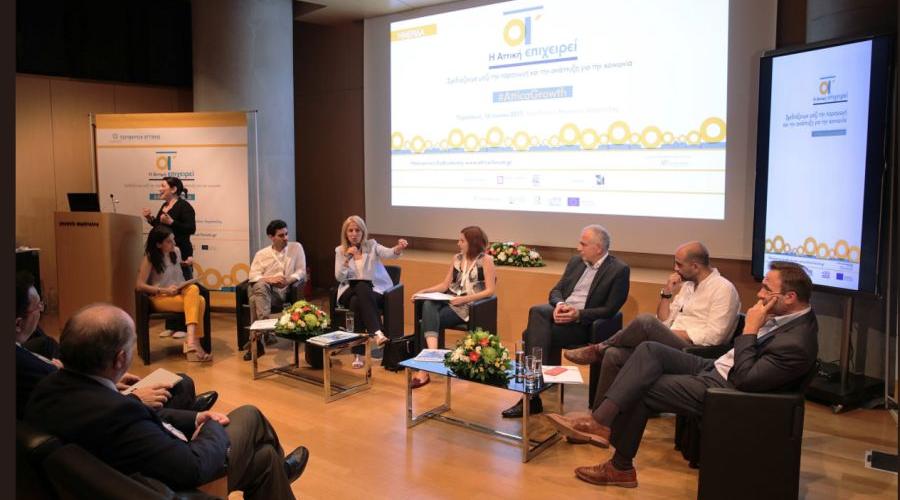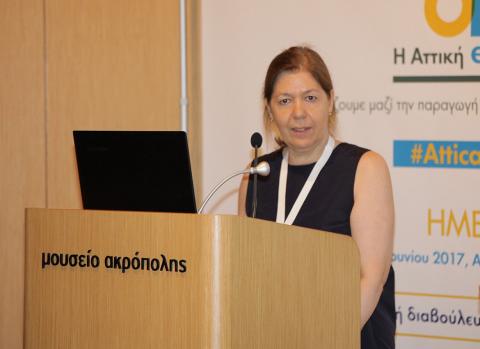
The exchange of opinions, experiences and good practices between representatives of public and private entrepreneurial organisations concluded the Attica workshop entitled ‘ Attica Acts’, which was organised by the Attica region as part of the ‘Entrepreneurship: Society-Development-Innovation’ programme held on 16 June 2017, at the Acropolis Museum Amphitheatre.
The three themed discussion areas on the agenda: ‘Looking Outward, Funding, Innovation’; Smart Specialisation and Sustainable Entrepreneurship’ and ‘ Supporting Neophyte Entrepreneurship and Good Practices’ provided representatives from a variety of organisations the opportunity to present the aspects and issues of entrepreneurship in today’s economic climate, particularly with respect to the benefits it offers society and the national economy.
The National Documentation Centre’s (EKT) own director, Dr Evi Sachini, contributed to the discussion on smart specialisation and sustainable entrepreneurship. Her presentation focused on the regional innovation system in Attica using indicators for research and development expenditure, personnel engaged in these activities, bibliometric performance, the participation of regional organisations in the European programme Horizon 2020 and compared the innovative performance of enterprises in Attica with that of enterprises nationally. She pointed out that Attica spends 56.8% of research and development, and is ranked first in terms of spending and scientific excellence.
The second part of her presentation concentrated on the potential and prospects of the creative industry sector for Attica. She drew attention to EKT’s related activities with reference to its websites www.searchculture.gr , www.openarchives.gr and http://repositories.ekt.gr) which all provide access to Greek digital cultural content. Acknowledging the unique cultural heritage of the region, she went on to stress its key position in the development of competitive advantages that will ensure Greek enterprises have a place in global competition.

Popi Stavropoulou, Regional Counsellor, Development Officer of Attica, presented the Attica Development Strategy and its financing tools. She also referred to the Region's strategic choice to boost entrepreneurship by supporting social welfare, with respect for the environment and emphasis on improving the quality of life of citizens.
George Vernikos, Honorary President of the Association of Vessel Owners of Professional Vessels and Chairman of Vernicos Yachts, then described the strengths of the blue economy and what actions it can enhance. He also stressed the great collective effort needed for this important pillar of the economy.
Alexandros Vassilikos, President of the Athens-Attica and Argosaronikon Hoteliers' Association, highlighted the need for synergies between actors (clusters, individuals, public bodies) in order to avoid fragmentary actions in a basic element of the national economy such as tourism.
For his part, Dimitris Niarchos, President of the Regional Research and Innovation Council, referred to the role of universities and research centres in sustainable entrepreneurship, which first provide education but transform knowledge into added value for society. He then gave examples of good practice.
Yiota Paparidou, First Executive Vice Chairman of the Association of Enterprise and Communications Enterprises (APPE), said the industry, which represents 8% of the country's GDP, is recognised as a sector which could bring in a high level of revenue. She also stressed that a problem which needs to be tackled is the considerable amount of money spent on research which fails to produce tangible results.
During the discussion ‘Looking Outward, Funding, Innovation, Dimitris Drosis, Head of Special Management Service of the Attica OP, developed the particular challenges of the current programming period and then analysed the priorities for entrepreneurship actions, referring to financial instruments, state aid and complementarity of actions between ministries. Mr Drosis concluded by noting that there was not only a need for training of the managing authorities, but also a need to use previous experience, reduce bureaucracy and implement targeted interventions.
Christos Kontogeorgos ,European Investment Bank, explained the EIB's funding process and financial tools, priorities, impact on areas of importance such as new job positions, health, potable water, transport, energy, urban growth and telecommunications.
Vasilis Korkidis, President of the Greek Confederation of Trade and Entrepreneurship , mentioned the exploitation of programmes which help the real economy, stressing that business should be boosted by targeting the need for entrepreneurship rather than the opportunity, determining where demand is and where saturation is. Finally, he made special reference to targeted clusters and the need for outward-looking policy.
Harris Lambropoulos, General Secretary of the Pharmaceutical Forum of the Athens Chamber of Commerce and Industry, commented on the special importance of ‘knowledge’ for generating ‘ideas’. He also highlighted examples of bad practices to avoid and the need to participate in programmes to support small and medium-sized businesses. Finally, he referred to start ups and startup awards that have brought new talent.
George Xirogiannis, Director of Policy Development of the Business and Industries Association (BSE), spoke extensively about the concept of an outward-looking approach, stressing that the objective to be achieved is the strengthening of productive networking and the link between innovation and research.
Finally, Christos Staikos, President of the Greek Enterprise and Foreign Trade (Enterprise Greece), emphasised the co-operation between all relevant actors with the focus on outward-looking approaches, creativity and utilising all existing tools. He further referred to attracting new investments and informing the markets about new products that will strengthen the business profile of each region separately and by extension the country.
In the final segment of the day’s workshop, ‘Supporting Neophyte Entrepreneurship and Good Practices’, successful entrepreneurs discussed their personal experiences from their chosen career paths with the Regional Governor, Rena Dourou, explaining how they had managed to succeed. The Regional Governor put a special emphasis on the social aspect of innovative entrepreneurship, while asking a number of questions about the conditions for its development in our country.
Natalie Levy, co-founder of Nannuka's innovative online service, explained how the company was founded, how the company expanded and how it had been promoted abroad.
Lucas Pelitsis, Chief Executive Officer & Partner of Anchorstone Partners and Pr. CEO of Private Equity & Venture Capital of the Piraeus Group, underlined that Greece has good potential, but that the private sector requires the help of the state.
For her part, Zoe Gavri, co-founder and managing director of Advantis Medical Imaging, mentioned the difficulties and peculiarities of her industry, where there are few companies at European level, while in Greece it is unique. She pointed out the difficulty of linking the University to the market. She also referred to the difficulties she had encountered in attracting initial capital.
Dimitris Kokkinakis, founder of the global network Impact Hub Athens, noted that the conditions for creating an appropriate ecosystem for successful innovation needs representation and diversity.
Mihalis Stangos, co-founder of Industry Disruptors - Game Changers, Managing Director of MSCOMM, said the company started without public money. He reported on the three postgraduate programmes he created with 26 scholarships co-operating with the private sector, as well as two postgraduate programmes in collaboration with research centers.
For his part, Petros Kokkalis, Municipal Executive Director of Local Economic Development and Entrepreneurship of the Municipality of Piraeus, referred to the business activity of Piraeus, paying particular attention to the importance of the blue economy and its advantages.
The conclusions of the workshop discussions reflected comments made in the opening speeches. As Rena Dourou stated, it is essential for there to exist co-operation between all entrepreneurial organisations, both institutional and non-institutional, in the design and implementation of programmes. Corina Cretu, Commissioner for Regional Policy, observed that a ‘spirit of co-operation’ has already been established in Attica and the financial period 2014-2020 should lead to new infrastructures, public services and the transition to an economic model supporting innovation and entrepreneurship. The Minister of Economy and Development, Dimitris Papadimitriou, added that Attica was in an ideal position to act as a network hub on a national and European level, ultimately to increase the per capita GDP, reduce unemployment, attract foreign investment, increase domestic small and medium-sized enterprises and reverse the ‘brain drain’.








